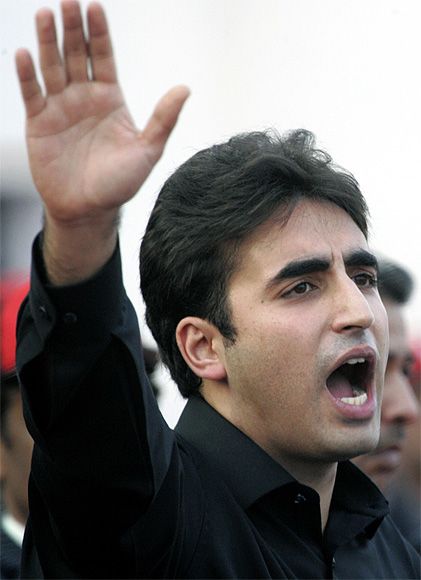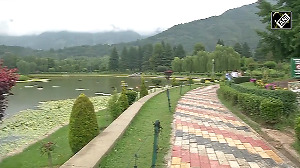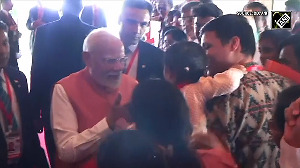 The India card is now almost obsolete. There are more pressing challenges. People of Pakistan are fed up with years of bad governance, corruption and broken promises of successive governments. However, the politicians and former generals are still provoking sentiments on what is happening on the Line of Control for petty political gains, says Shahzad Raza.
The India card is now almost obsolete. There are more pressing challenges. People of Pakistan are fed up with years of bad governance, corruption and broken promises of successive governments. However, the politicians and former generals are still provoking sentiments on what is happening on the Line of Control for petty political gains, says Shahzad Raza.
Bilawal Bhutto was first to pelt the stone. Then came Prime Minister Nawaz Sharif who hurled several. And now General Pervez Musharraf has joined the fun. They merely created ripples in a tiny pond of anti-India narrative that has long lost its real currency in Pakistan.
Other than mainstream political leadership, every Tom-Dick-And-Harry is bashing India these days in Pakistan, which many believe is a cheap and outdated ploy to garner public sympathy.
The India card is now almost obsolete. There are more pressing challenges. People of Pakistan are fed up with years of bad governance, corruption and broken promises of successive governments. However, the politicians and former generals are still provoking sentiments on what is happening on the Line of Control for petty political gains.
The escalation at the LoC coincided with political turmoil in federal capital Islamabad. The two self-professed revolutionaries -- former cricketer Imran Khan and Canadian national Tahirul Qadri -- besieged Parliament House in mid-August.
The domestic tension paralysed the Nawaz Sharif government after some indications that powerful military establishment wanted him to go. The government claimed it was not fool to open another front on the eastern border. But the analysts disagree that important strategic decisions vis-à-vis India are made in the prime minister’s house.
The chairperson of Pakistan People’s Party, second largest in Pakistan, picked the thread from where her mother left 24 years ago. In 1990, Benazir Bhutto visited Kashmir and challenged India when there were some indications that India might remove Article 370 from its Constitution.
Bilawal Bhutto Zardari inherited a fractured party. The allegations of corruption and bad governance haunted the entire five-year tenure of previous PPP’s government. Several loyalists of the late Benazir Bhutto left the party. The popularity graph of the party nose-dived owing to the policy of reconciliation with arch-political rival Pakistan Muslim League-Nawaz.
Since the beginning of political turmoil in Pakistan every political party is trying to grab maximum space in print and electronic media. New jargons are being coined. New slogans are being written. And the ruling party is facing hell of a tough time. In the war of narratives and to prove them more patriotic than others, the politicians are pulling every stunt they either did or witnessed in the past. Bashing India is just one of them.
Hardly a fraction of vociferous politicians would have visited the LoC or the people, affected by the cross-border shelling. Nonetheless, their statements suggested as if they had detected some big conspiracy against Pakistan and pre-empted every move by New Delhi.
The young leader of the PPP is a novice in politics, though he has inherited a very rich legacy. The Bhutto blood runs in his veins, yet he has to prove his mettle in order to take the party to the same glory it badly lost in the last general elections. The rabbit pullers within the ranks of PPP might have suggested him to exploit everything concerning ordinary Pakistanis. To his misfortune they failed to prioritise the areas he should have focused on. The India-bashing card could be played, but at some later stage.
When the over-zealous PPP leader vowed to get the entire Kashmir from Indian possession, he was mocked at from other side of the border. Several Pakistani analysts were equally shocked to hear him saying that.
“Bhuttoism was anti-India but Bilawal cannot flog the same horse today because the current mood is anti-West and not anti-India,” wrote senior journalist Najam Sethi in his weekly editorial.
And after initial outbursts it now seems the young Bhutto is keeping his focus more on domestic political issues.
Then entered Sharif and his useless journey to the United Nations to attend the General Assembly. Owing to the political turmoil some of his aides advised him not to leave the country. He rejected that advice.
Optimists were confident about the beginning of a new era of bilateral relations between India and Pakistan with PML-Nawaz and the Bharatiya Janata Party in power. They even dismissed the hawkish ideas that Prime Minister Narendra Modi wanted to make Pakistan a Gujarat-II.
Both right-wing parties were pro-trade and business. The previous governments of the PML-N and the BJP were that close to resolve some of the most thorny issues. It was even speculated that Modi would take it as an opportunity to present him a great statesman after A B Vajpayee. He played smartly by inviting PM Sharif to his oath taking ceremony.
Despite opposition back home, the prime minister of Pakistan attended the ceremony.
Things were going steady and the two countries agreed to resume the stalled dialogue at the secretary level. Then India cancelled the dialogue in protest when the Pakistani high commissioner in New Delhi held a meeting with Kashmiri separatist leaders. The Pakistani leadership condemned the Indian decision, but failed to convince the world what was the need to meet the Kashmiri leaders days before the dialogue. Diplomacy is an art not a science.
Amid that background Sharif visited the United Nations. There was no chance of meeting the Indian counterpart. In fact, the Foreign Office of Pakistan failed to set any high profile date. Secondly, he had nothing fancy to tell the world except the success of Pakistan army against Taliban militants in North Waziristan. And in order to please the military establishment he also raised the Kashmir issue.
The decision of the Nawaz government to try Musharraf on charges of high treason had spoiled civil-military relations. The tension peaked after Geo News accused then director general of the Inter Services Intelligence of plotting to assassinate senior journalist Hamid Mir. Not only did the PML-N government maintain a mysterious silence, the prime minister even visited Mir in hospital to inquire about his health.
“I was very disappointed the way things occurred one after another. I was not at all expecting the tension between civil and military would arise so quickly,” retired Air Vice Marshal Shahzad Chaudhry observed.
He said it seemed Sharif did not learn anything from his past mistakes. However, he ruled out the possibility of another spell of martial law in the country.
“The tension simmered but has subsided. The prime minister needs to take a few more visible steps to reduce it further. The tension exists, but has not and will not cross the danger level,” he said.
Retired Air Marshal Shahid Latif disagreed. He said the situation might take an ugly turn if the PML-N government did not change its policies. He said the armed forces were engaged in the most difficult war and the attitude of the federal government hurt their morale.
Realising he had crossed the line, the prime minister took some immediate steps to repair his relations with the army’s General Headquarters. He started hailing armed forces rather frequently. According to insiders solid guarantees were given to the military establishment that Musharraf would soon be allowed to go abroad. He even became first Pakistani prime minister to visit lawless North Waziristan.
And then came India bashing. He stated uttering words what the General Headquarters apparently wanted him to. The military establishment in Pakistan always wants to have final say on India, Afghanistan, America and the so-called war on terror.
Politicians like Imran and Qadri were reportedly acting at the behest of the military establishment to remove Sharif from power. They bashed India the best they could. By doing so they wanted to achieve two obvious objectives; to gain public sympathy and to please the supposed puppet-masters.
The religious leaders in Pakistan never lose the opportunity to showcase them the most patriotic Pakistanis ever lived. They made their contributions too. And, of course, there are several actors like Hafiz Saeed and Hamid Gul to take the general discourse to a whole new level.
As the tension at the LoC keeps on simmering the media wing of Pakistan army is feeding the electronic and print media with all the information, necessary. The media warfare and stories of the affected families recently forced the National Assembly to pass a strong-worded resolution against India.
The advisor to the prime minister on foreign affairs asserted the army was ready to pay back India in case of any aggression. Defence minister Khawaja Asif stated no one could take advantage of domestic turmoil in Pakistan.
Last but not the least, Musharraf jumped into the fray claiming India was planning a limited war with Pakistan, referring to so-called Cold-Start Strategy.
Shahzad Raza is an Islamabad-based journalist.
.jpg)









